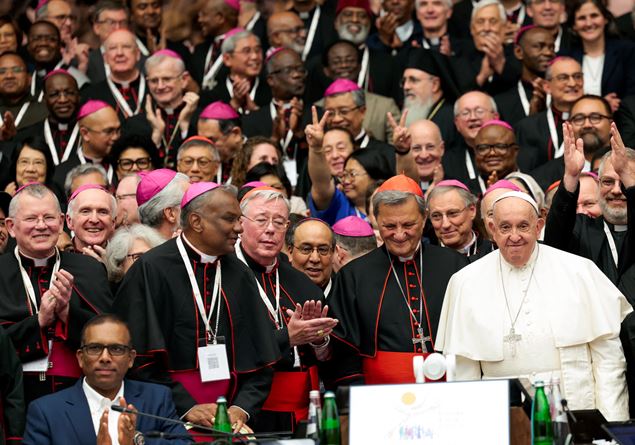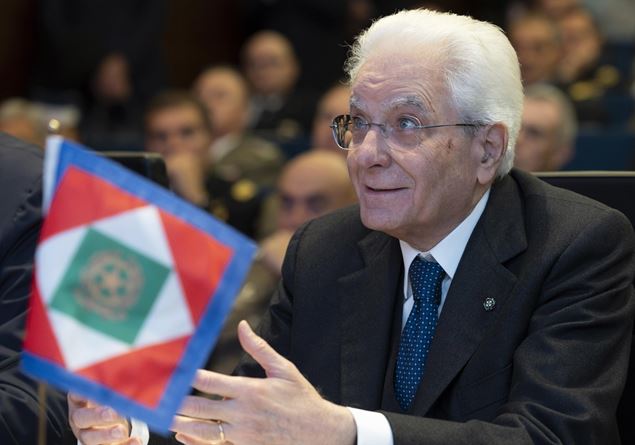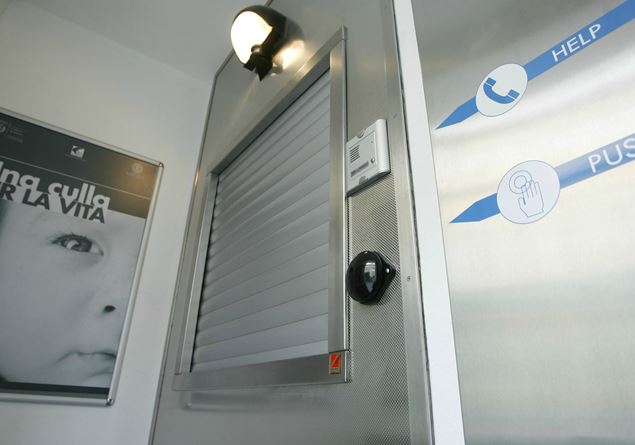
A document in five parts that puts everyone in agreement when it states, in number 1, that «Every new step in the life of the Church is a return to the source, a renewed experience of the encounter with the Risen One that the disciples experienced in the Cenacle on Easter evening. Like them, we too, participating in this Synodal Assembly, felt enveloped by His mercy and touched by His beauty. By living the conversation in the Spirit, listening to one another, we perceived His presence among us: the presence of Him who, by giving the Holy Spirit, continues to inspire in His People a unity that is the harmony of differences.”
«It was not», Cardinal Jean Claude Hollerich, general rapporteur at the Synod of Bishops, explains at the press conference, «a battle between conservatives and liberals», but everyone continued on the path undertaken a few years ago to valorise the differences while maintaining the unit.
Eight paragraphs approved unanimously and some more controversial. Like number 60 which was approved with 258 votes in favor and 97 against. And even if someone says that, in reality, even some participants who wanted a more decisive step voted against, the recognition that, although «by virtue of Baptism, men and women enjoy equal dignity in the People of God”, “women continue to encounter obstacles in obtaining fuller recognition of their charisms, their vocation and their place in the various areas of the life of the Church, to the detriment of service to the common mission”. The paragraph which underlines that «women constitute the majority of those who attend churches and are often the first witnesses of faith in families is particularly significant. They are active in the life of small Christian communities and in parishes; they manage schools, hospitals and reception centres; they lead initiatives for reconciliation and the promotion of human dignity and social justice. Women contribute to theological research and are present in positions of responsibility in institutions linked to the Church, in the diocesan Curias and in the Roman Curia. There are women who hold roles of authority or are leaders of communities. This Assembly calls for full implementation of all the opportunities already provided for by current law relating to the role of women, particularly in places where they remain unimplemented. There are no reasons that prevent women from taking on leadership roles in the Church: what comes from the Holy Spirit cannot be stopped.” The question of the diaconate remains open and discernment in this regard continues. In the meantime, however, «the Assembly also invites us to pay greater attention to the language and images used in preaching, teaching, catechesis and in the drafting of official documents of the Church, giving greater space to the contribution of holy women, theologians and mystical”.
Not only that, space for female presence is also required in the training of priests. And in number 148, it is also recommended “a revision of the Ratio Fundamentalis Institutionis Sacerdotalis which incorporates the requests developed in the Synod, translating them into precise indications for training in synodality”. The paragraph recalls that «along the synodal process, the request was widely expressed that the discernment and training paths of candidates for the ordained ministry be configured in synodal style. This means that they must include a significant presence of female figures, an inclusion in the daily life of the community and education to collaborate with everyone in the Church and to practice ecclesial discernment. This implies a courageous investment of energy in the preparation of trainers.”
Great space, in the document, and in the works, also for the poor, their cry, their centrality in recognizing Christ. They are cited 18 times in multiple paragraphs. And there is still room for the protection of everyone, in particular children “who not only need to be accompanied in the adventure of growing up, but have a lot to give to the community of believers”. In issue 61 it is recalled that «a society that does not know how to welcome and look after children is a sick society; the suffering that many of them suffer due to war, poverty and abandonment, abuse and trafficking is a scandal that requires the courage to denounce and the commitment to solidarity.”
And if a «healthy decentralization» is needed for the Petrine ministry, it is also underlined that «the decision-making competence of the Bishop, of the Episcopal College and of the Bishop of Rome is inalienable, as it is rooted in the hierarchical structure of the Church established by Christ at the service of unity and respect for legitimate diversity. However, it is not unconditional: an orientation that emerges in the consultative process as the result of correct discernment, especially if carried out by participation bodies, cannot be ignored. A contrast between consultation and deliberation is therefore inadequate: in the Church deliberation takes place with the help of everyone, never without the pastoral authority which decides by virtue of its office. For this reason the recurring formula in the Code of Canon Law, which speaks of a “only consultative” vote (tantum consultivum), must be re-examined to eliminate possible ambiguities”.
A dense document, composed of 155 paragraphs, which will now circulate in the local Churches. Starting from an awareness: that of being “merciful”, as the Pope said. “We have called our sins by name: against peace, against creation, indigenous peoples, migrants, minors, women, the poor , listening, communion”, they wrote. «This made us understand that synodality requires repentance and conversion. In the celebration of the sacrament of God’s mercy we experience being unconditionally loved: the hardness of hearts is overcome and we open ourselves to communion. This is why we want to be a merciful Church, capable of sharing with everyone the forgiveness and reconciliation that come from God: pure grace of which we are not masters, but only witnesses.”








